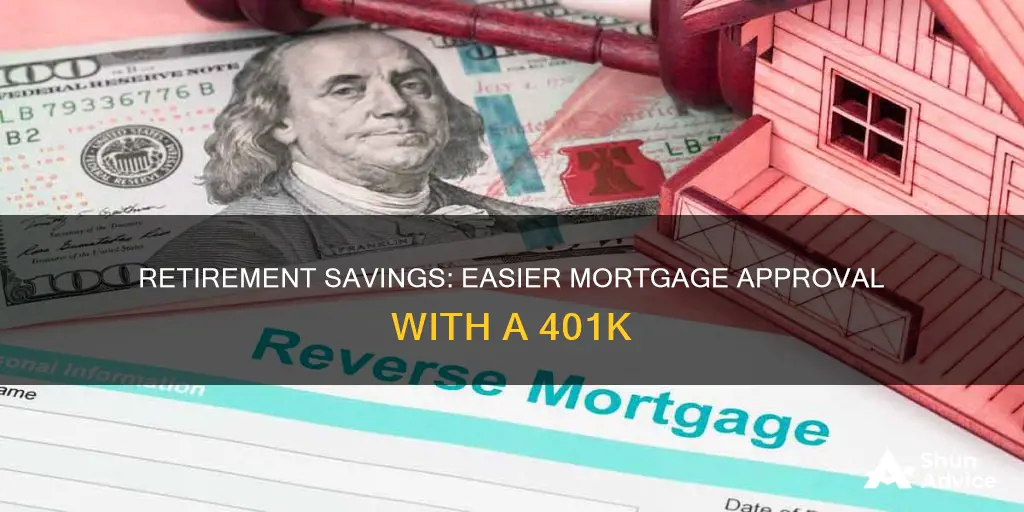
Taking out a 401(k) loan can be a good way to raise a down payment for a home. It can help you become a homeowner without affecting your mortgage approval or other debts. However, it is important to remember that you are losing out on the power of compounding until you repay the loan. Additionally, you may have to repay the loan within 90 days if you switch employers.
| Characteristics | Values |
|---|---|
| Impact on mortgage approval | A 401(k) loan can help with mortgage approval as it can be used to raise a down payment for a home. However, it is not recommended as an early withdrawal as it will impact future savings and compound interest. |
| Tax implications | A 401(k) loan is not a taxable event if loan limits and repayment rules are followed. An early withdrawal, on the other hand, is taxable and subject to a 10% early withdrawal fee for individuals under 59.5 years old. |
| Debt-to-income ratio | A 401(k) loan is not treated as a personal or student loan payment and is, therefore, unlikely to increase the debt-to-income ratio, a key metric for mortgage lenders. |
| Credit rating | A 401(k) loan does not impact an individual's credit rating. |
What You'll Learn

Using 401(k) as proof of reserve
When applying for a mortgage, a lender will evaluate your debts and income to determine if you are eligible for a loan. This includes analysing your debt-to-income (DTI) ratio, which is a key metric used to assess your ability to handle an extra obligation. A 401(k) loan is considered a debt obligation, but it is not treated in the same way as a personal or student loan. In fact, most lenders do not consider 401(k) loans when determining your DTI ratio, so it is unlikely to increase this ratio. This means that a 401(k) loan can be a good way to raise a down payment for a home without negatively affecting your mortgage approval.
Using a 401(k) as proof of reserve does not require you to withdraw the money. Instead, the lender wants to know how much money would be available if you withdrew the money to make mortgage payments. The lender will only consider 70% of the 401(k) funds, as the remaining 30% is allocated for the taxes incurred when withdrawing the money. This is a more financially savvy way to access your retirement savings, as a 401(k) loan does not incur the same taxes and fees as a withdrawal. However, it is important to remember that you are missing out on the power of compounding until you repay the loan, which can be detrimental to your future savings, especially for younger borrowers.
A 401(k) loan can provide short-term liquidity and is not considered a taxable event if the loan limits and repayment rules are followed appropriately. It is important to repay the loan quickly to maximise your savings. Additionally, if you switch employers, you may have to repay the loan within 90 days. Failing to repay the loan may result in taxes and early withdrawal penalties. Taking a 401(k) loan does not impact your credit rating or the rates and terms of your current or future mortgage. It is a good option if you need a little extra cash for a down payment, as it is your money and will not negatively affect your mortgage approval.
There are other options to consider if you need assistance with a down payment. Down payment assistance (DPA) programs provide money or special loans to buyers with low-to-moderate incomes. These programs are typically offered by federal or state agencies, and sometimes cities, and can come in the form of forgivable grants, low-interest loans, or second mortgages. Alternatively, you can ask the seller to cover some of your closing costs, although this may make your purchase offer appear weaker. If you already own a home, you can tap into your home equity through a home equity line of credit (HELOC) or a home equity loan.
EveryDollar Mortgage: Tracking Your Mortgage Paydown
You may want to see also

401(k) loans for down payments
A 401(k) loan can be a good way to raise a down payment for a home. It can provide short-term liquidity and access to your retirement savings. However, it is important to understand the risks involved.
Firstly, a 401(k) loan is not a taxable event if loan limits and repayment rules are followed. If you fail to repay the loan, the funds are subject to taxes and an early withdrawal penalty. You can borrow up to 50% of your account's vested balance or $50,000, whichever is less. Distributions from your 401(k) are taxed as ordinary income, and if you are under 59.5 years old, you will be taxed an extra 10% for early withdrawal. Generally, 401(k) loans must be repaid within five years, with payments made at least quarterly. However, if you leave your job, you may be required to repay the full outstanding balance, and your employer will be informed.
Secondly, there are potential downsides to borrowing from your retirement savings. You may miss out on the power of compounding until you repay the loan. The longer it takes to repay, the more you will miss out on compound interest. Some financial planners advise against borrowing from your 401(k) at all. You could also fall behind on saving for retirement, and loan repayments may affect your ability to contribute to your 401(k) in the future.
Thirdly, there may be alternative options to consider. For example, low- and zero-down-payment loan options are available, including those tailored to first-time homebuyers. Down payment assistance (DPA) programs can provide money or special loans to buyers with low-to-moderate incomes.
In conclusion, while a 401(k) loan can be a way to raise a down payment for a home, it is important to carefully consider the risks and alternatives before proceeding.
Removing the Deceased's Name from a Mortgage
You may want to see also

401(k) loans don't impact mortgage approval
A 401(k) loan can be a good way to raise a down payment for a home. It can provide a way to access your funds for short-term liquidity without impacting your mortgage. This is because a 401(k) loan is not technically a debt—you are withdrawing your own money—so it doesn't impact your debt-to-income ratio or your credit score, two big factors that influence lenders.
However, there are some drawbacks to taking a 401(k) loan. Firstly, you are removing funds from your investment, so you can miss out on the power of compounding until you repay the loan. The longer you take to repay the loan, the more you will miss out on compound interest. Also, if you fail to repay the loan according to the rules or fail to repay it at all, the funds are subject to taxes, and there may be an early withdrawal penalty.
Another problem with taking a 401(k) loan is that it can impede the performance of your portfolio and the building up of your retirement nest egg. However, this assumes the same rate of return over the years, which is not how the stock market works. The impact of a short-term loan on your retirement progress will depend on the current market environment and could be modestly negative, neutral, or even positive.
If you are considering a 401(k) loan, it is a good idea to look at other options and only use your retirement savings as a last resort. Every employer's plan has different rules for 401(k) withdrawals and loans, so find out what your plan allows. You may qualify for a traditional withdrawal, such as a hardship withdrawal, which is considered by the IRS to be an immediate and heavy financial need.
Renegotiating Your Mortgage: Strategies for Success
You may want to see also

401(k) loans are not taxable
A 401(k) loan can be a good way to raise a down payment for a home. It has no impact on your mortgage, whether it's your current one or the one you are applying for. It also does not affect your credit rating. However, there are some important points to consider:
Firstly, 401(k) loans are not taxable as long as the loan limits and repayment rules are followed. The IRS allows loans of $50,000 or 50% of your vested balance, whichever is less. If you borrow more than $50,000 or fail to repay the loan, the funds become taxable. Additionally, the interest attached to certain plans is the only tax consequence, and you pay this interest to yourself, not to a bank. However, this interest can be subject to double taxation as you use after-tax dollars to repay the loan, including interest. Nevertheless, the impact of double taxation is often negligible due to the typically modest interest rates of 401(k) loans.
Secondly, while a 401(k) loan can provide short-term liquidity, it comes at the cost of removing funds from your investment. This means you miss out on potential investment growth until you repay the loan. Therefore, it is generally advised to keep your retirement nest egg intact and explore other sources of cash if possible.
Lastly, if you leave your job, you may have to repay your 401(k) loan in full within a short time frame. Defaulting on the loan can result in taxes and a 10% penalty on the outstanding balance if you are under 59½ years old. Additionally, you will lose the tax advantages of contributing to your retirement account during the repayment period.
In conclusion, while 401(k) loans are not taxable if managed correctly, they can have other financial implications. It is important to carefully consider your ability to repay the loan and weigh the potential benefits against the opportunity cost of removing funds from your investment.
Illinois Mortgage Release: What You Need to Know
You may want to see also

Debt-to-income ratio and 401(k) loans
A 401(k) loan can be a good way to raise a down payment for a home. It can provide immediate funds to cover the down payment or closing costs for a home. However, it is important to remember that taking out a 401(k) loan means removing funds from your investment, which can cause you to miss out on the power of compounding until you repay the loan.
A 401(k) loan is not considered in your debt-to-income (DTI) ratio as it is an asset of yours, not money on loan from another source. It is the equivalent of "'borrowing'" funds from an existing account under your control. However, 401(k) loans will reduce what is considered to be your disposable income. This could impact the maximum mortgage size for which you qualify.
Since the 401(k) loan isn't technically a debt, it doesn't impact your debt-to-income ratio or your credit score, two big factors that influence lenders. It also has no impact on your mortgage, whether it's your current mortgage or one you are applying for. This is because, per IRS rules, a loan impacts neither the rates and terms of your current mortgage nor the application process for a new mortgage.
While a 401(k) loan can be a good option for some, it is important to consider the drawbacks. If you fail to repay the loan according to the rules or fail to repay it at all, the funds are subject to taxes, and there may also be an early withdrawal penalty. Additionally, if you part ways with your employer, you will need to pay back the loan immediately, or it will be treated as an early unqualified withdrawal, resulting in income taxes and a potential 10% penalty if you are younger than 59 and a half.
Writing a Gift Letter for Your Mortgage: A Simple Guide
You may want to see also
Frequently asked questions
No, a 401(k) loan does not impact your mortgage approval. It is not a taxable event and does not affect your credit rating. However, it is considered debt and may be evaluated by lenders during the approval process.
A 401(k) loan can help you raise funds for a down payment on a home. It can also be used to finance the purchase of real estate.
Some alternatives to using a 401(k) loan for a down payment include home equity loans, seller concessions, and down payment assistance (DPA) programs.







